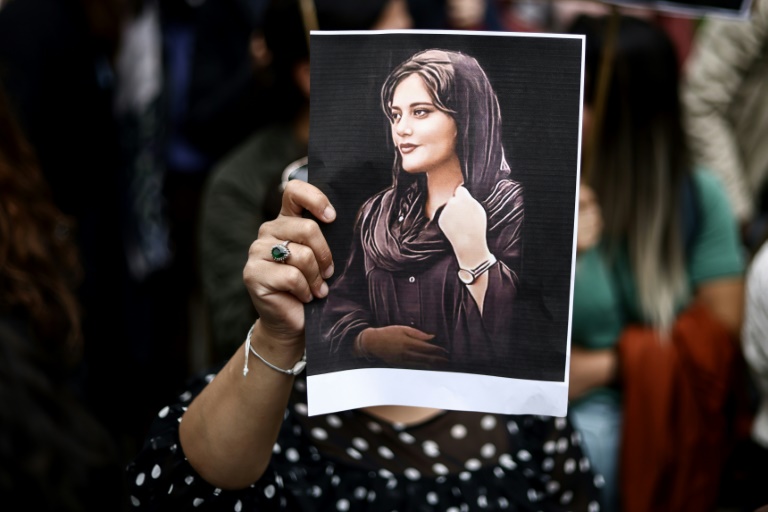Iranians stage new protest actions despite widening crackdown

Mahsa Amini, 22, died on September 16, three days after falling into a coma following her arrest
Paris – Iranian students protested and shopkeepers went on strike Saturday despite a widening crackdown, according to reports on social media, as demonstrations that flared over Mahsa Amini’s death entered an eighth week.
The clerical state has been gripped by protests that erupted when Amini, 22, died in custody after her arrest for an alleged breach of Iran’s strict dress code for women.
As the working week got underway, security forces adopted new measures to halt protests at universities in the capital Tehran on Saturday, searching students and forcing them to remove facemasks, activists said.
But students were seen demonstrating and chanting “I am a free woman, you are the pervert” at Islamic Azad University of Mashhad, in northeast Iran, in a video published by BBC Persian.
“A student dies, but doesn’t accept humiliation,” sang students at Gilan University in the northern city of Rasht, in footage posted online by an activist. AFP was unable to immediately verify the videos.
In the northwestern city of Qazvin, dozens were heard chanting similar slogans at a mourning ceremony 40 days after the death of protester Javad Heydari.
The Norway-based Hengaw rights group said people were observing a “widespread strike” in Amini’s home town of Saqez, in Kurdistan province, where shops were shuttered.
“Our weapon is our unity, our weapon is our rage, our weapon is our resistance… You cannot stand against the will of people,” tweeted Hassan Ronaghi, the brother of prominent rights campaigner Hossein.
– ‘Massacre’ –
Oslo-based group Iran Human Rights said Wednesday that at least 176 people have been killed by the security forces in the protest crackdown.
It said another 101 people had lost their lives in separate protests since September 30 in Sistan-Baluchistan, a mainly Sunni Muslim province in the southeast of the country.
An official in Kerman province admitted the authorities were having trouble quelling the protests that first broke out after Amini’s death on September 16.
“The restrictions on the internet, the arrest of the leaders of the riots and the presence of the state in the streets always eliminated sedition, but this type of sedition and its audience are different,” Rahman Jalali, political and security deputy for the province, was quoted as saying by ISNA news agency.
In a flare-up in Sistan-Baluchistan, up to 10 people, including children, were killed Friday by security forces in the city of Khash, Amnesty International said.
Molavi Abdol Hamid, the cleric who leads Friday prayers in Sistan-Baluchistan’s capital Zahedan, in a statement condemned the incident in Khash as a “massacre” that he said killed 16 people.
A video verified by AFP shows youths running for cover and screaming as bursts of gunfire are heard on a road in Khash.
Ultra-conservative President Ebrahim Raisi on Friday dismissed a pledge by his US counterpart Joe Biden to “free Iran”.
Campaigning for mid-term elections, Biden had said: “Don’t worry we’re gonna free Iran. They’re gonna free themselves pretty soon.”
– US downplays Biden remarks –
Raisi retorted that Iran had already been freed by the overthrow of the Western-backed shah in 1979.
“Our young men and young women are determined and we will never allow you to carry out your satanic desires,” he told a gathering commemorating the November 1979 seizure of the US embassy in Tehran by radical students.
US National Security Council spokesman John Kirby on Friday played down the American leader’s remarks.
“The president was expressing our solidarity with the protesters as he’s been doing, quite frankly, from the very outset,” Kirby told reporters.
Asked whether the Biden administration thought the Iranian regime could soon fall, he said: “I don’t believe we have indications of that kind”.
On Friday, the world’s largest cryptocurrency platform, Binance, acknowledged funds belonging to or intended for Iranians had flowed through its service and may have run afoul of US sanctions.
“Earlier in the week, we discovered that Binance interacted” with “bad actors” using Iranian cryptocurrency exchanges, said Chagri Poyraz, head of sanctions at Binance.
Some of these users “attempted to move crypto through Binance’s exchange,” he wrote on a blog on the company’s website. “As soon as we discovered this, we moved to freeze transfers (and) block accounts.”
No Iranian cryptocurrency platforms are currently under sanctions. But US-imposed restrictions prohibit a US entity or US national from selling goods and services to Iranian residents, businesses or institutions. The ban includes financial services.
